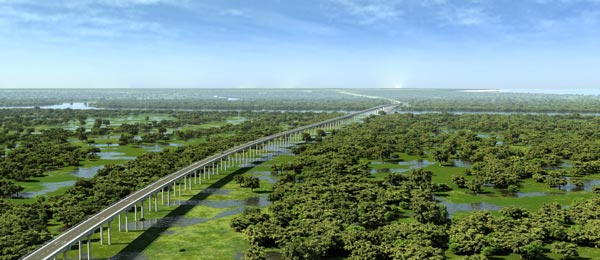|
 |
|
An artist's rendition of the Port-Gentil-Omboue project, which will link Gabon's second-largest city to the rest of the country. [Photo/China Daily] |
For years, Gabon's economic capital has been cut off, but that's changing
|
 |
The city and its surrounding regions, with rich oil reserves, are also home to a large number of oil companies. Indeed, it is from Port-Gentil that Gabon draws much of its wealth.
But Port-Gentil's isolation is expected to end soon, thanks to a road that a Chinese company, China Road and Bridge Corp, is building from Omboue, 93 kilometers to the south.
In a second phase from Omboue, another 270-km road will be built to link it with the national road network.
"For years, the country's economic capital has been cut off from the rest of the country, just like an island," says Yang Yi, general manager of China Road and Bridge Corp's operations in Gabon.
"It is expensive to fly to Port-Gentil, and the boat service is unreliable."
Easy, cheap transport has thus been a dream of Port-Gentil residents for years.
"That will be realized with our project," Yang says.
Construction of the Port-Gentil-Omboue project started in March and is expected to be complete in five years.
The cost is $600 million, with 95 percent of the funding coming from low-interest loans from the Export-Import Bank of China and the rest from the Gabonese government.
The cost is high because of the technical difficulties of the project, Yang says.
"A road of less than 100 km would normally be a lot less expensive, but this project is very different."
The road will pass through vast swamplands, and two bridges will need to be built, he says. Each of these will be more than 5 km long, making them the third and fourth-longest bridges in Africa.
So that shipping is not hampered, the number of piers holding the bridges will need to be limited.
"This will be a huge challenge for us," Yang says.
The base of the road will need to be very solid to cross the swampland, which means deeper foundations and thus higher costs, he says.
Another big problem is the lack of building materials near the construction site.
